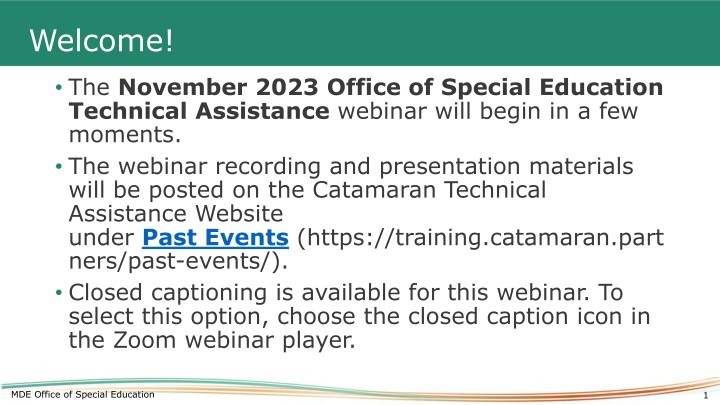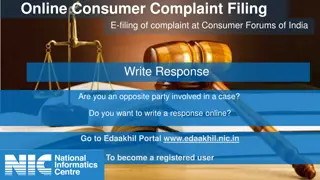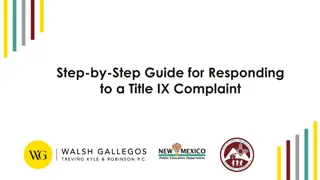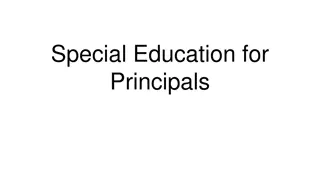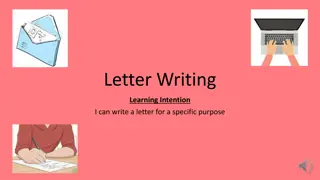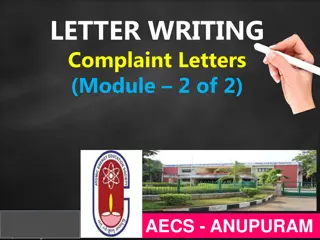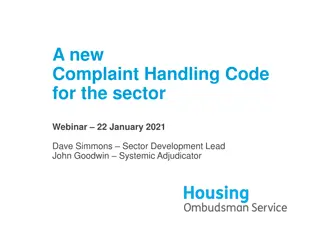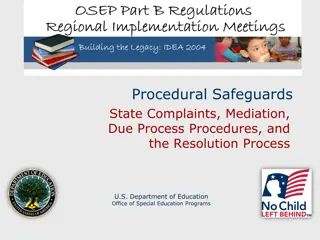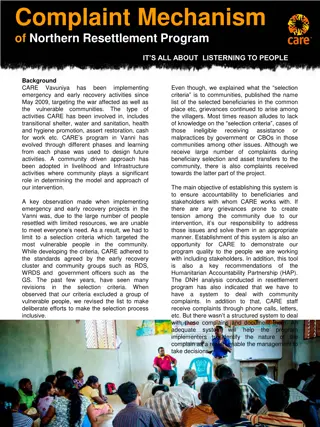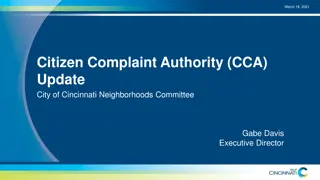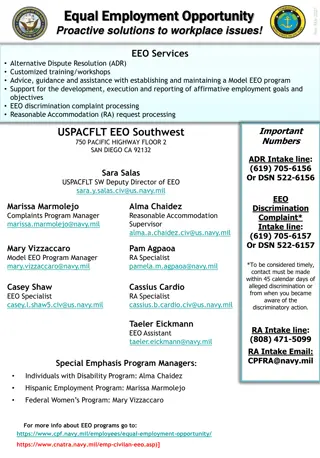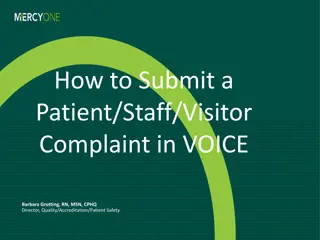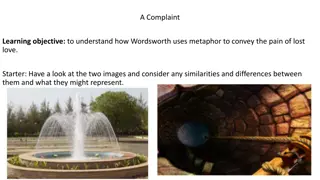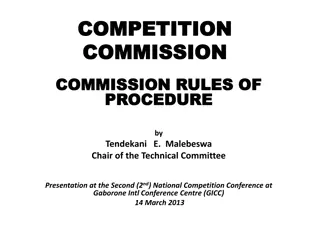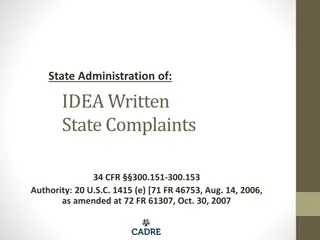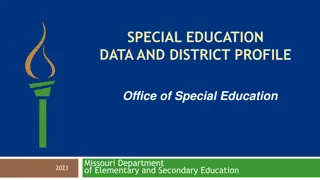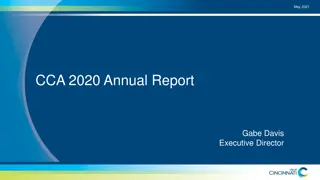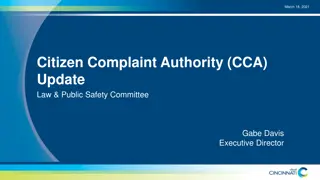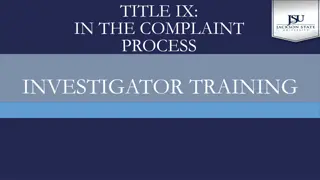State Complaint Process in Special Education
Explore the nuances of state complaints in special education, distinguish them from due process complaints, delve into the mediation process, analyze data trends, and understand the purpose of corrective actions within the context of special education programs and services in Michigan. Participants will gain insights into roles of various entities involved in the process.
Download Presentation

Please find below an Image/Link to download the presentation.
The content on the website is provided AS IS for your information and personal use only. It may not be sold, licensed, or shared on other websites without obtaining consent from the author.If you encounter any issues during the download, it is possible that the publisher has removed the file from their server.
You are allowed to download the files provided on this website for personal or commercial use, subject to the condition that they are used lawfully. All files are the property of their respective owners.
The content on the website is provided AS IS for your information and personal use only. It may not be sold, licensed, or shared on other websites without obtaining consent from the author.
E N D
Presentation Transcript
Welcome! The November 2023 Office of Special Education Technical Assistance webinar will begin in a few moments. The webinar recording and presentation materials will be posted on the Catamaran Technical Assistance Website under Past Events (https://training.catamaran.part ners/past-events/). Closed captioning is available for this webinar. To select this option, choose the closed caption icon in the Zoom webinar player. MDE Office of Special Education 1
State Complaints November 16th, 2023 Monthly Technical Assistance Michigan Department of Education Office of Special Education
Agenda State Complaint versus Due Process Complaint State Complaint Process Mediation State Complaint and Mediation Trend Data Corrective Action MDE Office of Special Education 3
Acronyms IEP: Individualized education program FAPE: Free appropriate public education ALJ: Administrative law judge DP: Due process SEMS: Special education mediation services ISD: Intermediate school district IDEA: Individuals with Disabilities Education Act MARSE: Michigan Administrative Rules for Special Education SEA: State educational agency CAP: Corrective action plan SLCAP: Student level corrective action plan MDR: Manifestation determination review MDE Office of Special Education 4
Objectives Participants will be able to: oDescribe the difference between a state complaint and a due process complaint. oDetail the state complaint process, the role of the district, the ISD, and the Michigan Department of Education Office of Special Education (MDE OSE). oExplain the mediator s role during mediation. oAnalyze state complaint and mediation data at the state level. oDetail corrective action purpose within a state complaint. MDE Office of Special Education 5
Definition of a State Complaint May be filed on behalf of an individual student, a group of students, or regarding a system-wide concern. Is a written, signed statement that alleges a public agency has violated the requirements of the IDEA, the MARSE, or the Michigan Revised School Code, as it pertains to special education programs and services. MDE Office of Special Education 6
Definition of a State Complaint (Part 2) May be filed when it is believed a public agency has failed to implement an: oIEP oALJ s decision, oISD plan for the delivery of special education programs and services, or othe state application for federal funds under the IDEA. MDE Office of Special Education 7
Definition of a Due Process Complaint Is used to resolve a formal complaint regarding the identification, evaluation, educational placement, or provision of a free appropriate public education (FAPE) to a child who needs or is suspected of needing special education and related services. Special Education Due Process Complaint Procedures (michigan.gov) MDE Office of Special Education 8
Difference between State Complaint And A Due Process Complaint State Complaints Due Process Who: Anyone can file and OSE investigates Timeline: Investigate issues 1 year back from date of receipt Who: Only parent or public agency may file. An ALJ hears a due process case Timeline: ALJ hears issues 2 years back from the date the complaint meets requirements MDE Office of Special Education 9
Difference between State Complaint And A Due Process Complaint (Part 2) State Complaints Due Process What: oCan investigate any issues related to: o Michigan Administrative Rules for Special Education (MARSE), or o Individuals with Disabilities Education Act (IDEA) What: oWill hear cases regarding: o Identification, o Evaluation, o Educational placement of a child with an IEP, or o Provision of a Free Appropriate Public Education (FAPE) MDE Office of Special Education 10
Difference between State Complaint And A Due Process Complaint (Part 3) State Complaints Due Process How: oMediation is optional oFinal decision issued within 60 calendar days oThere is no appeal process How: oA 30 calendar day resolution period is required oA hearing decision must be issued within 45 calendar days of the end of the resolution period oA hearing decision can be appealed. MDE Office of Special Education 11
Our Purpose We believe a strong State complaint system provides parents and other individuals an opportunity to resolve disputes early without having to file a due process complaint and without having to go to a due process hearing 71 Fed. Reg. 46600 (2660) Purpose: Ensure all students with disabilities have access to a free appropriate public education (FAPE) Provide technical assistance to parents and districts through issuance of final decisions MDE Office of Special Education 12
Powerful Tool Address noncompliance Supports interests of children with disabilities and their parents Technical Assistance oDecision is an opportunity oStarts from the beginning oFor parents, attorneys, advocates, and districts 13
State Complaint Requirements IDEA requires SEAs to adopt written procedures for: o Resolving any complaint meeting requirements o Remedies for denial of appropriate services: Corrective action Future provision of services for all children with disabilities IDEA requires SEA to: o Complete the investigation and o Issue a final written decision within 60 calendar days o Provide parents an opportunity for mediation o State complaints that overlap due process complaints go into abeyance 14
State Complaint Requirements (Continued) Required components for a state complaint request: oSigned, written complaint oStatement of a violation of Part B or Part C of the IDEA oFacts to support the statement oComplainant signature and contact information oFor specific students: Name and address Name of school Description of the problem oCopy of the complaint forwarded to the public agency 15
Resource for State Complaint Special Education State Complaints: Procedures and Model Forms (michigan.gov) Release of Information Model Form (michigan.gov) MDE Office of Special Education 16
Investigatory Process Intake Sufficiency Introduction letter Issues letter Submission of documentation Interviews/questionnaires Final report Corrective action if necessary 17
Roles OSE ISD Provide: oIssues letter oDistrict staff to interview oDraft interview questions oDraft finding of fact Lead interviews Determine and present conclusion, decision, and corrective action. Review and provide input to: oIssues oDistrict staff to interview oInterview questions oFinding of fact Schedule and participate in interviews Support identified areas of improvement MDE Office of Special Education 18
Mediation Benefits of Mediation: Solutions may be delivered to the student in a timelier way as opposed to the state complaint and due process timelines. Participants control outcomes. Participants become self-sufficient. Solutions remain local. More time, money spent on educating. MDE Office of Special Education 19
Mediator Responsibilities The Mediator will: Remain neutral. Conduct the mediation. Ensures appropriate conduct. Keep parties on topic. Guide the parties toward an agreement. Record the agreement. A Mediator will not: Make decisions Give legal advice Take sides MDE Office of Special Education 20
Number of State Complaints Filed by Month 35 32 32 30 27 25 20 15 10 4 5 0 July August September October MDE Office of Special Education 21
State Complaints by Grade Level High School 33 Elementary 30 Middle School 18 Preschool 8 Systemic 5 Post-Secondary 1 0 5 10 15 20 25 30 35 MDE Office of Special Education 22
Parties Filing State Complaints Data Parent 59 Advocate 21 Other 7 Advocate/Attorney 6 Parent/Attorney 1 Other 1 0 10 20 30 40 50 60 70 MDE Office of Special Education 23
State Complaint Data by Category Evaluations 42 IEP Development 24 IEP Implementation 20 Discipline 18 Other 15 0 5 10 15 20 25 30 35 40 45 MDE Office of Special Education 24
Mediation Data State complaints o14 mediation services Two no agreement Nine full agreement Three session not held MDE Office of Special Education 25
Disagreement With a State Complaint Final Decision When a final decision is issued by the MDE, the decision is final. The MDE state complaint process values and utilizes the 60-calendar-day timeline to ensure a comprehensive state complaint investigation. Administrative appeal or reconsideration requests are not permissible in Michigan. MDE Office of Special Education 26
Corrective Action In resolving a complaint in which the SEA has found a failure to provide appropriate services, the SEA must address noncompliance by: oincluding corrective action appropriate to address the needs of the student; and oaddressing future provision of services for all students with disabilities. MDE Office of Special Education 27
Corrective Action (Part 2) Once the OSE identifies noncompliance, it is responsible for tracking and monitoring the district s implementation of the corrective action activities ordered. MDE Office of Special Education 28
Verification of Correction General supervision systems must include: oa method of verifying whether or not the corrective action plan activities have been implemented, and owhether the results of such corrective action have brought the LEA into compliance with Part B of the IDEA. MDE Office of Special Education 29
Types of Corrective Action The OSE may order districts to take corrective action that includes but is not limited to: oStudent level corrective action (SLCAP) to address the needs of the child, oDistrict level corrective action (CAP) to ensure appropriate future provision of services for all children with disabilities. MDE Office of Special Education 30
Tiered Correction Action The SEA will track identified noncompliance for state complaints when a district has but is not limited to having the following: oThree or more state complaints, the district will be assigned targeted corrective action. oFive or more state complaints, the district will be assigned intensive corrective action. oA state complaint that contains excessive and egregious violations may be assigned targeted or intensive corrective action. MDE Office of Special Education 31
Tiered Corrective Action (Continued) Universal corrective action Targeted corrective action Intensive corrective action MDE Office of Special Education 32
Proof of Compliance The OSE and the ISD will monitor and verify progress on the completion of ongoing corrective action activities prior to closing out the state complaint. Verification of correction to ensure sustained compliance. MDE Office of Special Education 33
Recap State Complaint versus Due Process Complaint State Complaint Process Mediation State Complaint and Mediation Trend Data Corrective Action MDE Office of Special Education 34
Contact Information Questions related to today s presentation MDE-OSE-TA-Monthly-Calls@michigan.gov MDE-OSE Information Line Interpreter Services Available MDE-OSE@Michigan.gov 1-888-320-8384 MDE Office of Special Education 35
